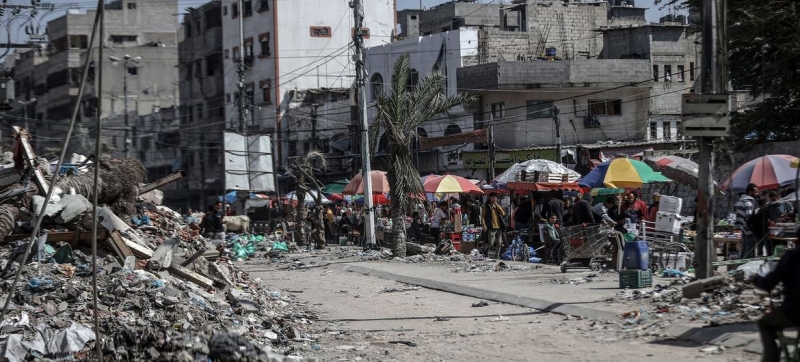
Destruction in the Gaza Strip. War in Gaza: death toll rises, aid delivery hampered Peace and security
Amid international calls for Israel to show restraint in Gaza and reports of new attacks on the strip last night that killed civilians, UN aid workers stressed on Wednesday the need to ensure reliable aid supply routes into the enclave.
“A third of all families living here have children under five,” said Matthew Hollingworth, head of the UN World Food Program (WFP) office for Palestine, speaking at a school in Deir el-Balah. “They need continued education in schools, but above all, more clean water, more stability. They need a normal life.”
Representatives of the United Nations Agency for Palestinian Affairs in the Near East (UNRWA), which runs the school, noted that there have been more than 360 attacks on UNRWA facilities since the start of the war. It killed or injured tens of thousands of people and damaged critical infrastructure, including an UNRWA water well in the town of Khan Younis.
According to UNRWA public affairs officer Louise Wateridge, Renewing this valuable water source will require clearing out tons of debris that contains many hazardous materials.
School Shelter
The UNRWA Al-Qastal School in the central part of the Strip is now home to some 2,400 families displaced by the nearly seven-month war in Gaza.
“People come there from all over the strip, from Gaza City, from neighboring Khan Yunis, from all the areas affected by the war,” Matthew Hollingworth said. His comments come amid unconfirmed reports that two children were killed in an overnight Israeli strike on a house in Rafah, and more in an attack on an apartment building in Gaza City.
The WFP representative noted that UN humanitarian organizations, together with international and local partners, are successfully collaborating in providing assistance in the north of the sector. It includes food and special nutritional supplements for children and infants.
Obstacles to the delivery of aid
The UN Office for the Coordination of Humanitarian Affairs (OCHA) said Israeli authorities had blocked or excessively impeded three-quarters of all UN-coordinated missions to areas in need in Gaza.
“After full coordination with the Israeli authorities, one of these missions set out for northern Gaza but was forced to wait more than nine hours before entering the north and on the way back to Rafah,” OCHA said. “Such delays jeopardize humanitarian missions and put aid workers at risk, as fighting between Palestinian armed groups and Israeli forces often occurs near checkpoints.”
House demolitions in the West Bank
There, OCHA has released new data from the occupied West Bank showing that the demolition of Palestinian property and population displacement continues.
According to the latest figures from the Office, as of April 22, more than 380 structures had been demolished in the West Bank, displacing 650 people from their homes.
If destruction continues at the same rate, then, according to OCHA calculations, 1,500 objects will be demolished by the end of the year. This is a record figure since data collection began in 2009. The heaviest damage occurred in Jerusalem, where 80 buildings were destroyed and 115 people were displaced.
According to the latest data from Gaza health authorities, Israeli attacks on Gaza have killed 1,000 people since October 7. at least 34,568 Palestinians and 77,765 injured.
